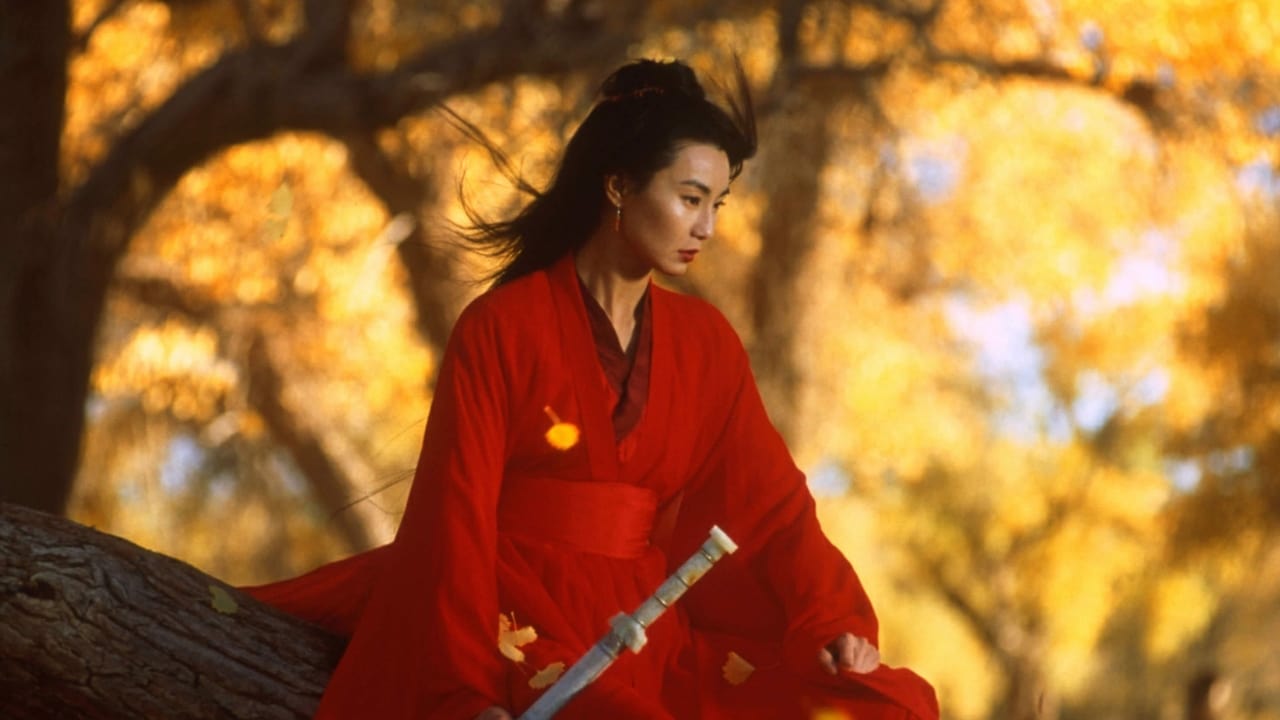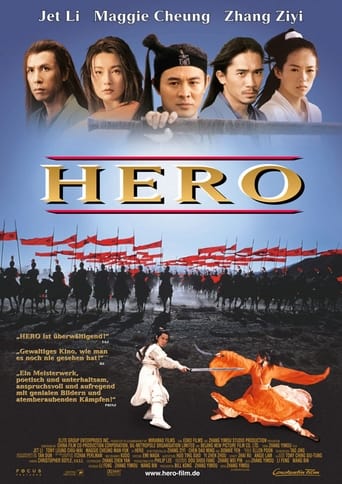

There's no doubt 'Hero (2002)' is lavish, with opulent production design decorating sometimes upwards of eighteen-thousand period-dressed extras and elaborate fight choreography coming up in almost each and every scene (whether or not it's honestly needed). However, all of its splendour tells a tale that essentially amounts to very little other than thinly veiled pseudo-propaganda (though an argument can be made for full-blown propaganda) that paints one of China's past ruthless dictators as a misunderstood 'hero'. No amount of overindulgent excess can fix that or do anything towards making you care about the admittedly impressive visuals you're seeing. All it does is drive the budget through the roof. This was - at its release, at least - China's most expensive motion picture and, while it certainly shows in the scale of the scenery, it isn't reflected by the scope of the story. It's not like the movie is particularly bad. The action-sequences are usually quite breath-taking, using their literal 'story' nature to 'make sense of' - or otherwise solidify - and accentuate their slightly fantastical nature. They often fall into a place of total inconsequence, though, with some being entirely invented even within the possibly invented narrative in which they appear. They also usually lack the weight to make them feel tangible, impactful or properly consequential. This is something not helped by the fact that we know how most of them turn out, due to the poorly acted framing device. This actually acts as more of a limitation than a unique way to tell the tale. It does allow for various perspectives to be placed upon similar events, which are portrayed with varying colour schemes to initially unnoticed but ultimately appreciated effect, but doesn't allow for enough divergence within the narrative and neuters the possibility of anything having any real consequence until the movie catches up with itself. Once it does, its message becomes even more confused and more likely to inspire an eyebrow being raised than the swell of pride that's intended. By this time, the poor pace of the piece has become grating, to the point that the previously somewhat awe-inspiring fight-work has become kind of a chore to sit through, which, perhaps strangely, makes the ending feel less definitive than it actually is. This is really because there isn't a sense of structure, no proper finale outside of an uncharacteristic choice that only serves to pander to the movie's agenda, as opposed to the natural direction of the character's intentions. There are some slightly resonant themes stuck in there, though, even if you have to read past some pretty operatically iffy outside elements to get to them. In the end, the film is much more impressive from a visual standpoint than a narrative one. Even this doesn't hold up, though, because you don't really care about the characters and, as such, can't stay fully engaged throughout. 5/10
... View MoreA beautiful masterstroke from director Zhang Yimou, Hero is a beautifully constructed wuxia film that is infused with history, Chinese culture, honor, and themes of overcoming hate and the pain that can be caused from not conquering that hate. Through this film, Zhang Yimou not only creates a terrifically entertaining martial arts action film, but he also creates a film that is a moving and stirring look at the unification of China and the sacrifices that went into that monumental step.While the movie does take some liberties with historical retelling, what top box office film doesn't? Without fail, the movie plucks at the heart-strings of its viewers and masterfully captures the human aspect of War and how it affects the minds of the ruled.
... View MoreI really did enjoy this movie. The cinematography was sublime and kept the movie in it's entirety from being a flop. The story line was a little bit of a stretch for me, interesting, but a little over the top. However, the cinematography is what really made the watching experience so enjoyable. The directors use of varying angles, speeds, and lighting adds that little bit of oomph to the film. Vibrant colours, extreme close ups, and slow motion scenes seem to be at the center. The director executes the filming techniques in such a way that they add so much more to the film and he does a good job of making sure they don't detract. All in all - I'd recommend this film to somebody who enjoys good cinematography, but I wouldn't recommend it for the story.
... View MoreHero is concerned not only with physical prowess and ability, but also the battles that occur within the mind. The entire film then takes place solely within the confines of the king of Qin's palace, and they are trading stories, not blows. Like in Rashomon, they are fighting for their own version of the story, attempting to gain an upper hand in the proceedings. And within these stories there are also mental battles; Long Sky and Nameless' initial clash is in their imagination, a vicious one-on-one muted in grey-scale. They are like chess grandmasters, with each blow calculated and bringing infinite possibilities and outcomes, so that the fight is over before it has begun. Their mastery of the art of swordfighting makes this possible. The choreography of Hero is in the wuxia style, which has been codified over time so that Western audiences may also come to appreciate and know its art. Masters of the style float over long distances as if they are suspended by strings, barely needing to touch the ground before they gracefully float away again (affectionately dubbed 'wire-fu'). When they fight their movements are so ferociously fluid that they whip up leaves into tornadoes, which curl around the characters themselves. Zhang Yimou is concerned with form as much as he is with function; Flying Snow does not merely repel, but dances amongst the rain of arrows, and the writers inside are painting with ink as red as blood, also fiercely devoted to their craft. Consider this: Broken Sword derives his mastery of swordplay from the strokes of his calligraphy. Or is it the other way around?The prominent art of Christopher Doyle is also on display. He begins with an initial dreary grey, a drabness to the present day story. This allows for the sharp contrast of the stories the two men tell, which are each punctuated strongly with their own colour code. There are a many number of possibilities and interpretations here. I was shocked by the vividness of the red ink, and its likeness to the blood shed by the diligent students of calligraphy. In the demonstration of the 10 pace killing technique Doyle and Yimou find beauty and tranquility in the cool blues, the apt slow motion, the little dink of the sound design as the cup lands on the sword. The blade is shown to be as ferocious as it is gentle. Robed in white, he reveals a purer technique, a strike of such surgical precision magnified in the shallow focus and slow motion. Yimou uses the latter well, cutting judiciously from serenity to furious motion, assuming the perspective of these masters who move and see at a different speed level. They whip their blades which such strength that they the metal bends and groans to their touch.The king tells his story with such passion and understanding. In his version, Flying Snow and Broken Sword are lovers so desperate to take the fall for each other they must resort to fighting for that honour. It is a tragic love story, more so than the apparent truth. This also points to the king's understanding of the nature of sacrifice; he is able to imagine the sorrow and grief of a sword twisted just enough to wound but not to kill, and that sword being beaten to save the life of another. So he is also able to recognise the greatest sacrifice of them all, and that sometimes the greatest warrior is the one who lays down their sword. So in the end it is indeed tranquility that wins out.
... View More